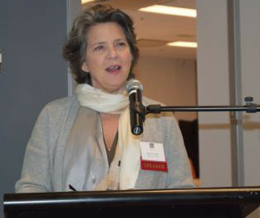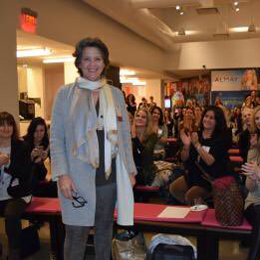Changing the Portrayal of Women in Advertising

Madonna Badger, Founder and Chief Creative Officer of Badger & Winters, is on a mission to change the advertising industry. Madonna’s early success with Calvin Klein’s iconic Marky Mark campaign (and many others) prompted her to launch her New York-based advertising, branding and design agency, Badger & Winters, in 1994. After losing her parents and three children in a house fire on Christmas Eve 2008, Madonna found her new mission – to stop the objectification of women in advertising.
Speaking at a recent NYWICI’s Cocktails and Conversations event, Madonna began her talk by sharing how she’s struggled with intense emotions anew, due to the recent death of her ex-husband and father of her children. It was this loss, combined with a growing realization of the power that advertising has to attack women’s confidence through objectification that led Madonna to dedicate her life to make a difference in the world. That’s why she decided to tackle an industry she knew intimately — the world of advertising.
Her firm researched the effect that objectification of women has on individuals and brands. It found that the approach can have a significantly negative impact on both purchase intent, as well as on brand reputation. Based on its findings, Badger & Winters has pledged to no longer create imagery that objectifies women. They took their commitment even further by creating the #WomenNotObjects campaign to encourage other ad agencies to follow suit.
Meanwhile, the campaign has convinced Cannes Lions International Festival of Creativity to caution jurors not to recognize work that reflects gender bias.
 Madonna showed powerful, provocative images and statistics to illustrate the myriad of ways women are objectified in advertising and explained the four key filters the campaign uses to determine whether an ad is objectifying:
Madonna showed powerful, provocative images and statistics to illustrate the myriad of ways women are objectified in advertising and explained the four key filters the campaign uses to determine whether an ad is objectifying:
- Props: A woman is reduced to only a “thing” in an ad.
- Plastic: A woman has been retouched beyond achievability.
- Parts: A woman is reduced to provocative body parts only.
- Empathy: An ad prompts the viewer to ask, “What if this were my mother, my daughter or myself?”
Attendees surveyed at the event said they were shocked to learn that “gender bias is still strong,” even though we “have more say than ever before in advertising decisions.”
“It’s amazing,” said another attendee, “how some brands, even reputable ones, are making bad choices”, “how little has changed” and how ads today are “reflective of ads from the ’60s and ’70s.”
The evening ended with a lively, engaged question and answer session, during which Madonna encouraged us all to take action. Here’s how:
- Use our spending power and refuse to buy from brands who objectify women.
- Take photos of objectifying ads and post them on social media.
- Make sure we, as women, know and teach our daughters that our weight and appearance is not our worth.
- Support brands that empower women.
“I plan on using my money as my voice,” said one attendee. “As a female consumer, I will carefully choose where I spend my money. I will only shop at places whose labor conditions and advertising campaigns align with my values.”
Said another, “I’ve already noticed a difference in the way I looked at images in ads today. I plan to be more vocal about ads that are offensive to women, both as a consumer and as a professional who is a part of this industry.”
To learn more about the #WomenNotObjects campaign, visit womennotobjects.com and follow the campaign on Twitter: @Not_Objects.
— Robyn Hatcher
